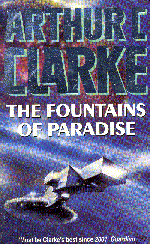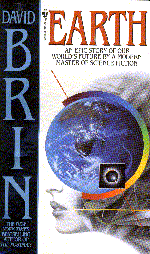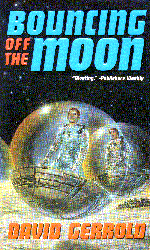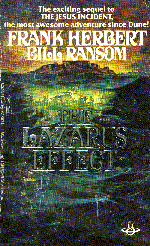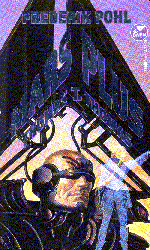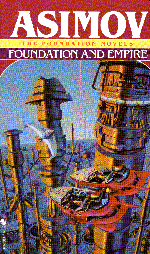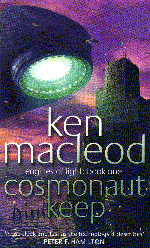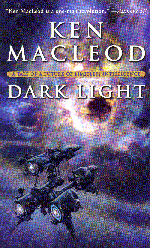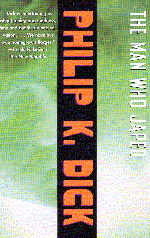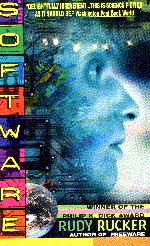|
Tentacles The SF Reviews newsletter, 31st January 2003 I'm particularly happy to finally have a review of a Philip K. Dick novel. Dick's stories get made into movies more than Frank Herbert, who's also in the reviews this month. On the subject of movies, let's segue into Dr Strangelove with a few seconds of Edwin Star's
Dr. StrangeloveI watched Dr. Strangelove or: How I Learned to Stop Worrying and Love the Bomb on cable last night. Now that is a superb movie. However, I have to say I'm still confused about this war stuff. I thought we were fighting a war against Islamic fundamentalist terrorism, a war outside the bounds of the Geneva Convention, a war in which we do not take POWs. Now I find out that we're actually going to attack a tin-pot secular dictator who has no links with religious terror. I'm sure the oil will be useful but I don't see how it's going to stop terrorism. Still, back to the SF.
Best Books This MonthThe best books this month were, very best first:
And following somewhat further behind:
It's so great to review novels by Dick and Herbert. Dick was my favorite writer for many years, a writer of stunning imagination and wonderful skill. Frank Herbert was so much more than simply the writer of the Dune series. Yes, of course Dune was very good, but there's more to life than sandworms. I do not understand how I have managed to miss David Gerrold for the past thirty years. He even did a book with Larry Niven and I missed that. Still he's achieved great things with his Dingillian family trilogy, of which "Bouncing Off The Moon" is the second volume. Macleod continues to churn out novels that are stimulating and enjoyable. They're very good and sometimes he breaks through, for a few pages, to something quite brilliant. He manages this in "Cosmonaut Keep" but not in "Dark Light".
Worst Books This Month
"The Fountains Of Paradise" and "Passion Play" are mediocre. That's not so bad for Sean Stewart since "Passion Play" was his first novel. However the leaden "The Fountains Of Paradise" should be an embarrassment to Arthur C. Clarke, normally a writer of superb fiction. "Fountains Of Paradise" is about space elevators and I seem to recall that the late Bob Shaw wrote a novel about a one? All I can remember about him at present is the "Orbitsville" trilogy. If anyone remembers, drop me an email. It's astonishing that David Brin, the writer of "The Postman", could produce a book like "Earth". It was boring, lacking in tension, a jumble of plot-lines and uninteresting characters.
This Month's Reviews
Next Month's ReviewsLast month I all but promised the Susan R Matthews and Katherine Kerr reviews. Ha! How could I have been so wrong! They were and still are at top of the pile, but I didn't even get close to the pile, I didn't even get into the same room. And "Dhalgren", pah, Dhalgren's up there on the shelf, the sunlit cover shining down at me, but has a page been turned this month? Nope, there's even a fine trace of dust sparkling across the page edges which looks quite pretty so I may allow it to develop for a while. So who knows about next month? Maybe there will be some Kerr and Matthews, and probably James Alan Gardner's "Commitment" and Wil McCarthy's "Collapsium".
Those Magnificent Men In Their Flying MachinesEver since I first saw Rocket Man at Saturday morning pictures, I wanted a jetpack. I watched the movie The Rocketeer and thought it was a technological tour-de-force. I wanted to strap a jetpack to my back and blast off into the upper atmosphere. Something along the lines of the Rocketbelt would have been a good starting point. But I never expected my personal flying machine to look like the Solotrek XFV. When the Solotrek XFV just doesn't cut it, upgrade to the thousand-fold speed boost of the NASA nuclear-powered spacecraft.
Science Note - Far Out PhysicsNASA does some research into leading edge science topics. The Breakthrough Propulsion Physics Research Task Summaries includes some astounding, mind-bending ideas. Now these projects are just so great, so wonderfully exotic, I just have to highlight some points from the summary:
Most of us accept that we live in a world explicable by science. After all everything pretty much works as we expect. But these projects are looking into the dirty little mouse-holes of reality, where things don't work quite as expected. Sometimes these projects will simply patch up the hole, but sometimes they'll tear the wall down. That's all for now. As always, tell me what you think about the books, the reviews and the site. Do let me know if there are books you think I should review.
Take care
Max
|
|


